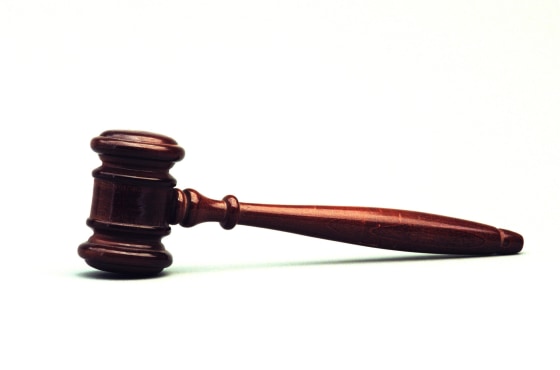Most of the candidates thought to be on President Barack Obama’s shortlist for the U.S. Supreme Court have two things in common — a previous record of Republican backing and a history of financially supporting Democrats in campaigns.
According to an analysis of the Federal Election Commission database by the Center for Responsive Politics and NBC News, most of the potential nominees have given donations to Democratic politicians including President Obama, presidential candidate and former Secretary of State Hillary Clinton and other members of Congress.
It is “common knowledge that presidents have generally chosen for appellate courts members of the same political party as the president,” said Stuart Summit, an attorney, who in 1987 was nominated by former President Ronald Reagan to the 2nd Circuit Court of Appeals
History shows the same for Republicans nominating candidates who have financially supported the Republican Party.
For example, Harriet Miers, a former lawyer and White House Counsel nominated by George W. Bush, has a track record of contributing to the campaigns of prominent Republican figures including senators Orrin Hatch, R-Utah, John Cornyn, R-Texas, former presidential candidates Jeb Bush and Rick Perry and George W. Bush 2000 campaign.
Last year, for example, she gave $2700 to Jeb Bush’s presidential campaign.
Such contributions are considered fairly standard, judicial experts say.
Related: How Bad Will Confirmation Process Get? Ask These Would-be Judges
“I assume the contributions were all sent before they went on the bench. That's pretty normal. Lawyers with aspirations for judicial appointments almost always make political contributions to their party's candidates. Otherwise, they are unlikely to be considered for appointment,” said Frank Askin, Professor of Law, Robert E. Knowlton Scholar at Rutgers Law School.
Still, the partisan fight to fill the court vacancy after the death of conservative Supreme Court Justice Antonin Scalia brings into sharp relief how politics can affect the judicial branch.
A number of Senate Republicans have vowed not to confirm, or even meet, the potential nominee put forth by the Obama administration.
Related: Supreme Court Vacancy: Who's on President Obama's Shortlist to Replace Scalia?
Before Scalia’s passing, the Court was divided with five justices appointed by Republicans and four appointed by Democrats.
The White House has said it is less concerned with a nominee’s affiliation and more interested in that person’s qualifications.
“It’s been true for as long as we have data available that presidents almost always appoint Supreme Court justices from their own party. It would be shocking if Obama were to appoint someone who appeared to favor Republicans,” said Alan I. Abramowitz, political science professor at Emory University.
The potential nominees currently under consideration or being currently vetted by the Obama administration include two judges who have been previously confirmed unanimously by both parties, federal appellate judge Sri Srinivasan and 8th Circuit judge Jane L. Kelly; Merrick B. Garland, a chief judge of the D.C. Circuit Court of Appeals; Paul Watford and Patricia Ann Millett, federal appeals court judges, and the only district court judge, Ketanji Jackson, U.S. District judge for the District of Columbia.
Related: Inside the Knotty Fight Over Obama's Choice on Supreme Court
Srinivasan, who was confirmed to the D.C. Circuit by a unanimous 97-0 vote in 2013, has contributed at least $7,251 to Democrats including money to Obama’s 2008 presidential campaign, a Kansas congressional candidate and the Democratic National Committee. The contributions were made between 2007 and 2011 made while he was a partner at O’Melveny and Myers, according to Federal Election Commission records
Kelly, like Srinivasan, was confirmed unanimously to her current post on the United States Court of Appeals for the Eighth Circuit in 2013. She was strongly supported by her home-state senator, Charles Grassley, an Iowa Republican and the chairman of the Judiciary Committee, putting pressure on Republicans to confirm. Kelly has given to both Obama’s first and his re-election campaign in 2008 and 2012 — a total of at least $1,500, according to Federal Election Commission records.
Millett, a former head of Supreme Court practice at the law firm Akin Gump Strauss Hauer & Feld LLP and a 2013 appointee to the D.C. Circuit, supported both Obama and the current Democratic presidential candidate Hillary Clinton during the 2008 election season.
During Obama’s 2008 and 2012 campaigns, Millett gave at least $7,600 in joint fundraising contributions. She also gave $2,300 to Clinton’s 2008 presidential bid against Obama, according to Federal Election Commission records.
By comparison, Jackson, who if nominated and confirmed, would become the first black woman to fill the vacancy on the Supreme Court, donated at least $400 to Obama’s 2008 campaign. Jackson is related by marriage to House Speaker Paul Ryan.
Among the potential nominees, she is the only district judge and the only candidate to be twice confirmed without any Republican opposition in the Senate.
Meanwhile, another candidate in contention, Paul Watford, is the federal appeals court judge and a former clerk to Alex Kozinski, an appointee of former Republican President Ronald Reagan.
Despite his conservative-friendly record of being a clerk to a Republican appointee, Watford has given congressman to Adam Schiff, D-California, $1,000 to DNC Services Corp, a political action committee and $1,000 to Obama between 2004 and 2009.
Garland, the chief judge of the D.C. Circuit Court of Appeals, was previously considered by Obama for Supreme Court vacancy. He does not have a record showing any donations made to either Democratic or Republican party.
“The type of individual likely to be considered as a serious candidate for a nomination to the United States Supreme Court is an individual with substantial judicial and government service. These are people who have served in positions where it is important to distinguish between personal policy objectives and the requirements of the law, which is often different.” Edward Fallone, an associate professor at Marquette Law School said.
